
Zhejiang is an eastern coastal province of China. Zhejiang is bordered by Jiangsu and Shanghai to the north, Anhui to the northwest, Jiangxi to the west, and Fujian to the south. To the east is the East China Sea, beyond which lie the Ryukyu Islands of Japan.
The Moon System of Embossed Reading is a writing system for the blind, using embossed symbols mostly derived from the Latin script. It is claimed by its supporters to be easier to understand than Braille, though it is mainly used by people who have lost their sight as adults, and thus already have knowledge of the shapes of letters.

Wu is a group of linguistically similar and historically related varieties of Chinese primarily spoken in the whole city of Shanghai, Zhejiang province and the southern half of Jiangsu province, as well as bordering areas.
The Suzhou dialect, also known as Suzhounese, is the variety of Chinese traditionally spoken in the city of Suzhou in Jiangsu Province, China. Suzhounese is a variety of Wu Chinese, and was traditionally considered the Wu Chinese prestige dialect. Suzhounese has a large vowel inventory and it is relatively conservative in initials by preserving voiced consonants from Middle Chinese.

Jiangnan or Jiang Nan is a geographic area in China referring to lands immediately to the south of the lower reaches of the Yangtze River, including the southern part of its delta. The region encompasses the city of Shanghai, the southern part of Jiangsu Province, the entire Zhejiang Province, the southeastern part of Anhui Province, the northern part of Jiangxi and Fujian Provinces. The most important cities in the area are Shanghai, Anqing, Changzhou, Hangzhou, Nanjing, Ningbo, Shaoxing, Suzhou, Wuxi, Zhenjiang and Fuzhou.

The Yangtze River Delta or YRD is a triangle-shaped metropolitan region generally comprising the Wu Chinese-speaking areas of Shanghai, southern Jiangsu province and northern Zhejiang province. The area lies in the heart of the Jiangnan region, where Yangtze River drains into the East China Sea. The urban build-up in the area has given rise to what may be the largest concentration of adjacent metropolitan areas in the world. It covers an area of 99,600 square kilometres (38,500 sq mi) and is home to over 115 million people as of 2013, of which an estimated 83 million is urban. If based on the greater Yangtze River Delta zone, it has over 140 million people in this region. With about 1/10 of China's population and 1/5 of the country's GDP, the YRD is one of the fastest growing and richest regions in East Asia measured by purchasing power parity. Having a fertile soil, the Yangtze River Delta abundantly produces grain, cotton, hemp and tea. In 2018, the Yangtze River Delta had a GDP of approximately US$2.2 trillion, about the same size as Italy.
The sub groups of the Han Chinese people, also known as Sinitic peoples, Chinese dialect groups or just dialect groups, are defined based on linguistic, cultural, genetic, and regional features. The terminology used in Mandarin to describe the groups is: "minxi", used in Mainland China, or "zuqun", used in Taiwan. Other than Hui people, which is a classification for Muslims of all backgrounds, no Han subgroup is recognized as one of People's Republic of China's 55 official minority ethnic groups.

Taizhou, previously known as Taichow, is a city located at the middle of the East China Sea coast of Zhejiang province. It is located 300 km (190 mi) south of Shanghai and 230 km (140 mi) southeast of Hangzhou, the provincial capital. It is bordered by Ningbo to the north, Wenzhou to the south, and Shaoxing, Jinhua, and Lishui to west. In addition to the municipality itself, the prefecture-level city of Taizhou includes 3 districts, 2 county-level cities, and 4 counties.
At the 2010 census, its population was 5,968,838 inhabitants whom 3,269,304 lived in the built-up area made of 3 urban Districts and Wenling City now being largely conurbated.

Shangyu District is a district of the prefecture-level city of Shaoxing in the northeast of Zhejiang province, China. At the 2010 census, its population in the built-up area was 779,412, up from 722,523 in the 2000 census. Shangyu is roughly fifty kilometers from north to south and about thirty kilometers from east to west. It makes up about one-fourth of the area of Shaoxing prefecture. Shangyu District is not part of the Hangzhou-Shaoxing built-up area as some countryside still prevent the city from being conurbated until now.

Ningbo Lishe International Airport is the principal airport serving Ningbo, a major city in the Yangtze River Delta region and the second largest city in Zhejiang Province, China.
William Armstrong Russell (1821–1879) was an Irish Protestant Christian missionary to China, and served as the Anglican Bishop of North China.

Jiangbei District is a county-level district under the jurisdiction of Ningbo city in Zhejiang Province of the People's Republic of China. The district's total area is 209 square kilometers, which is the largest subdivision in traditional urban area of Ningbo city. Jiangbei District is famous for its historical sites such as the Old Bund, which oversaw the history of international trade of Ningbo, and Cicheng Town, an ancient town which lasts more than 1000 years.
The Wu Chinese people, also known as Wuyue people, Jiang-Zhe people (江浙民系) or San Kiang (三江) are a major subgroup of the Han Chinese. They are a Wu Chinese-speaking people who hail from southern Jiangsu province, the entirety of the city of Shanghai and all of Zhejiang province, as well as smaller populations in Xuancheng prefecture-level city in southern Anhui province, Shangrao, Guangfeng and Yushan counties of northeastern Jiangxi province, and some parts of Pucheng county in northern Fujian province.
Taihu Wu (吳語太湖片) or Northern Wu dialects (北部吳語) are a group of Wu dialects spoken over much of southern part of Jiangsu province, including Suzhou, Wuxi, Changzhou, the southern part of Nantong, Jingjiang and Danyang; the municipality of Shanghai; and the northern part of Zhejiang province, including Hangzhou, Shaoxing, Ningbo, Huzhou, and Jiaxing. A notable exception is the dialect of the town of Jinxiang, which is a linguistic exclave of Taihu Wu in Zhenan Min-speaking Cangnan county of Wenzhou prefecture in Zhejiang province. This group makes up the largest population among all Wu speakers. The subdialects of this region are mutually intelligible with each other.
Dongqiao, is a town in Yinzhou District, Ningbo, Zhejiang, People's Republic of China. Located in the southwestern suburbs of the city, it is roughly 5 kilometres (3.1 mi) southwest of Ningbo Lishe International Airport. There are many factories in the area, including a plastic factory in Shagang Village.
Bayanqolu is Chinese politician of Mongol heritage. He is the Communist Party Secretary and former Governor of Jilin Province in Northeastern China; Bayanqolu is, as of 2015, the only ethnic-minority official serving as a provincial-level Party Secretary.

The Great Dictionary of Modern Chinese Dialects is a compendium of dictionaries for 42 local varieties of Chinese following a common format.
The individual dictionaries cover dialects spread across the dialect groups identified in the Language Atlas of China:









